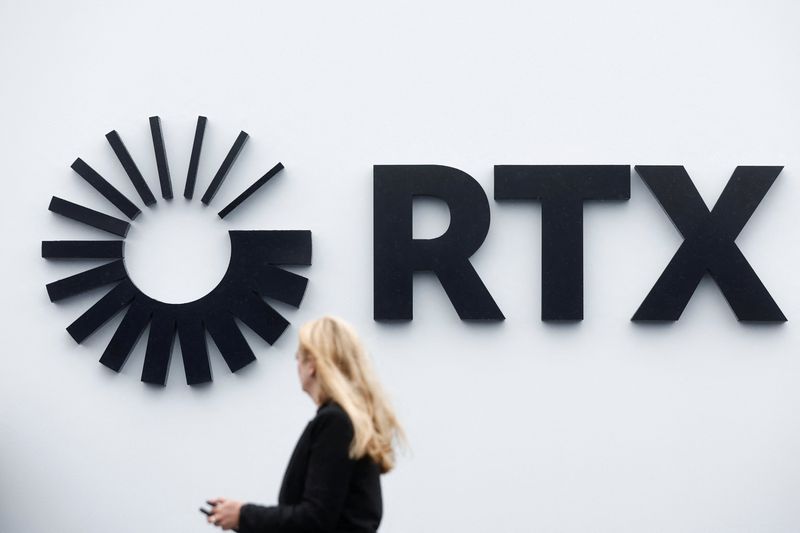By Pratyush Thakur, Mike Stone and Valerie Insinna
(Reuters) -RTX reported better-than-expected quarterly earnings on Tuesday, as a strong performance at its Collins Aerospace business offset the impact from a major quality crisis at engine-making unit Pratt and Whitney.
The company also approved a $10 billion share repurchase program that will be funded through short and long-term debt.
Shares of the aerospace major were up 6.3% in early trade.
RTX said in July it had found microscopic contaminants in powdered metal, used to manufacture high-pressure turbine discs that are part of the engine's core, the presence of which could lead to cracks.
RTX had at the time said 200 Geared Turbofan (GTF) engines would require "accelerated inspection" with 60 days to fix each engine with a contamination issue. However, two months later, it expanded the scope of inspections and said it would need to pull up to 700 engines off aircraft for lengthy quality inspections.
The powdered metal issue has forced RTX to shorten the expected life of certain parts for the PW1500 and PW1900 engines, which will cause "some incremental" groundings of Airbus A220s and Embraer E2 aircraft in the first half of 2024.
RTX also expects to accelerate the removal and inspection of 100 V2500 engines, which power A320ceo aircraft, over the next four years.
Despite other engine types impacted by the metal contaminant issue, Chief Financial Officer Neil Mitchill told Reuters in an interview on Tuesday that "we do not see a significant incremental financial or operational impact."
Maintenance shop output remains the biggest risk for executing the GTF inspection plan, executives said. RTX expects to have 16 repair facilities by end of 2023 after bringing six facilities online.
The company is also ramping up production of high pressure turbine and compressor disks to replace potentially contaminated ones, and plans to be manufacturing at full rate by second-quarter 2024.
Pratt and Whitney, a subsidiary of RTX, booked a $2.48 billion operating loss in the reported quarter related to engine recalls and compensations to airlines.
But profit at RTX's Collins Aerospace unit, which makes avionics and aerospace components, rose 22% to $903 million.
RTX reported an overall third-quarter adjusted profit of $1.25 per share, beating Wall Street estimates of $1.21, according to LSEG data.
Adjusted revenue rose 12% to $18.95 billion, ahead of analysts expectations of $18.59 billion.
Despite the GTF-related losses, RTX raised its outlook for 2023, forecasting free cash flow of $4.8 billion compared with its previous prediction of $4.3 billion. The company now expects reported sales of $68.5 billion, up from about $67.5 billion, and adjusted sales of $74 billion, up from $73 billion.
Adjusted earnings per share - previously projected to be $4.95 to $5.05 - are now expected to be between $4.98 and $5.02.

The Arlington, Virginia-based company also entered into an agreement to sell its Cybersecurity, Intelligence and Services business within its Raytheon (NYSE:RTN) segment for around $1.3 billion.
Private equity firm Blackstone (NYSE:BX) was the purchaser of the business, two sources familiar with deal said on condition of anonymity. Blackstone did not immediately return a request for comment.